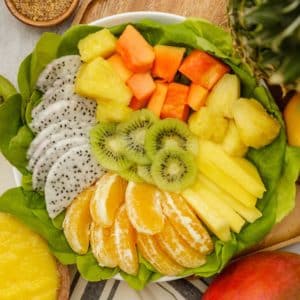Start your day by waking up your taste buds with this sweet and easy to prepare fruit bowl. Full of fiber and vitamins A, C, and K, it is a great start to meeting your daily nutritional requirements.

Break the Fast with a Bowl Full of Sunshine
Packed with an assortment of fruit and leafy greens, this bowl packs a nutrient-dense punch. As a rich source of vitamin A and C, papaya helps boost your immune system by removing toxins from your body. Spinach has a multitude of essential vitamins, minerals, and nutrients. Add in the rest of the fruit and you have a bowl full of nutrients to get your day started right!

Why Spinach For Breakfast?
A spinach filled breakfast can provide a variety of health benefits as part of a balanced diet, and it can help you meet your daily nutrient recommendations. Spinach is high in calcium, iron, magnesium, and vitamin A. Your body can make the most of a nutrient-dense breakfast when it has the proper fuel in the morning.
Eaten raw, the leafy green's powerful antioxidants and inflammatory properties provide a multitude of nutritional benefits, such as improving the health of your eyes, combating depression, and lessening your risk of chronic disease.
Spinach Isn’t Just For Popeye
If Popeye the Sailor Man could get his strength from spinach, you can, too. This leafy vegetable is considered a superfood, because there's little doubt that low-fat,, nutrient-dense spinach is a superfood, given its vitamin and mineral content.
Rich with a multitude of essential vitamins, minerals, and nutrients, spinach is a well-known nutrient-dense ingredient used in many different types of diets. Spinach contains minerals such as potassium, magnesium, copper, zinc, and manganese. These help your body regulate body fluids, cell functions, heart rate, and blood pressure.
Spinach is particularly beneficial in treating iron deficiency because it has a high iron content. Besides addressing anemia, iron also helps in the activity of several enzymes. 100 grams of spinach contains around 25% of the daily requirement of iron.
Spinach also contains protective steroids called phytoecdysteroids, which increase glucose metabolism and help to keep blood glucose levels stable. This is extremely beneficial for people with all forms of diabetes, because spinach can blunt blood glucose spikes during the beginning of your transition to eating more carbohydrate-rich food.
Spinach also contains a good amount of fiber in each serving, which can help slow the absorption of glucose into the bloodstream to keep blood glucose levels steady.

Perk Up With Papaya
In addition to spinach, this bowl contains beneficial fruit such as papaya. Papayas contain high levels of the antioxidants vitamin A, vitamin C, and vitamin E.
Diets high in antioxidants may reduce the risk of heart disease. The antioxidants prevent the oxidation of cholesterol. When cholesterol oxidizes, it's more likely to create blockages that lead to heart disease.
Papaya is one of the most beneficial fruits you can eat for gut health due to its high amounts of beneficial digestive enzymes. They soothe the gut and assist with the digestion of proteins and fats.
Fruits like papaya, orange, and plum are also great natural laxatives for getting rid of constipation, even in people with a long history of this condition. These fruits contain large amounts of fiber and water, which speed up intestinal flow and make the formation of stools easier.
A medium-sized papaya (approximately 275 grams) contains about:
119 calories
1.3 grams of protein
30 grams of carbohydrates
Less than 1 gram of fat
4.7 grams of dietary fiber
2 grams of sugar

Buying Tips
When choosing a papaya at the store, consider when and how you want to eat it. Green papayas are not ripe yet and will not have the characteristic flavor or texture. Papayas with red and orange skin are riper. You want it to be slightly soft to the touch, but not overly soft.
If you do buy unripened papayas, store them at room temperature to allow them to ripen before consuming.
Once you are ready to eat the papaya, simply cut it open, scoop out the seeds, and eat the orange interior. The skin and seeds are not poisonous, but most people do not eat them.


Breakfast Sunshine Fruit Bowl
Ingredients
- 1 cup Boston lettuce - chopped
- 1 cup spinach - chopped
- 1/8 large papaya - peeled, seeds removed, and cut into chunks
- 2 small oranges - (or 1 large orange) peeled & sliced
- 1 mango - peeled, pit removed and cut into thick slices
- 1 green kiwi - peeled & sliced
- 1 cup pineapple - cut into spears
- 1/4 dragon fruit - peeled & sliced
- 1 tsp ground flaxseed
Instructions
- In a small blender place 1 orange, ½ mango and ¼ cup pineapple. Blend until smooth. Set aside and use as dressing for the fruit bowl.
- In a serving bowl place the lettuce and spinach.
- In the bowl arrange the fruit, papaya, slices of 1 orange, remaining mango slices, kiwi slices, remaining pineapple spears, and dragon fruit slices.
- Pour fruit dressing over the fruit and sprinkle with flaxseed.
- Mix the whole bowl just before eating.

